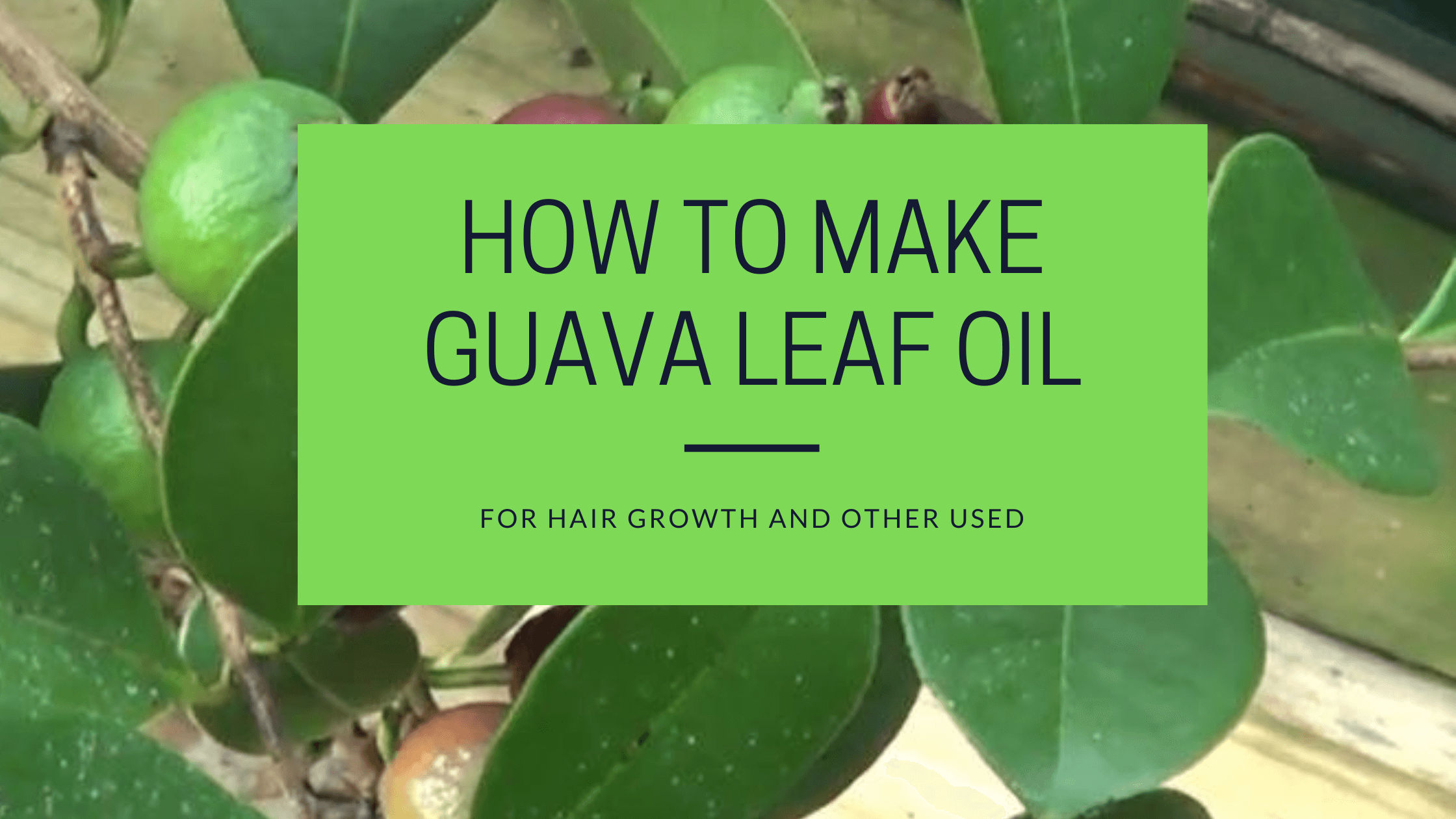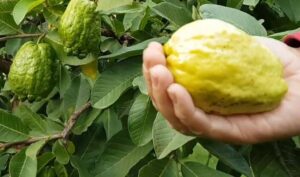In this article, we are going to focus on providing you information about how to make guava leaf oil for hair growth at home.
You can also use this diy guava leaf oil for different purposes.
In a rush? To make guava leaf oil, blend 15-20 fresh guava leaves if you want to use fresh. Measure out 1 cup of coconut oil or any carrier oil of your choice and add to a container with cap. Add the blended guava leaves to the container. Shake the container very well and store for 24 hours.
Use and finish this infused oil within 2-3 days to avoid contamination by microorganisms such as fungi.
However, if you are using dried guava leaves, you can use the oil for upto a month without contamination.
Read on for a detailed step by step guide and tips on how to make the oil with dried guava leaves.
Overview
Guava leaves contain an essential oil that is park with numerous phytochemical compounds which include phenolic compounds, minerals, and unsaturated fatty acids.
These compounds and minerals are proven to be effective for hair growth and skin health.
And so extracting the essence from guava leaves in form of oil will be a great way to derive the most important components of guava leaves.
Methods for Essential Oil Extraction
There are various ways in which you can extract oil from organic matter.
The most common methods of oil extractions from organic matters are:
- Fractional distillation
- Maceration
- Infusion
Fractional Distillation
Fractional distillation is a well known method that is commonly used to separate liquid mixtures into their respective constituents. For the distillation of guava leaves essential oil using fractional distillation, the distillation process is carried out under vacuum.
The leaves of guava are usually ground into a paste using mortar and pestle. Then, guava leaves paste is passed through steam and the different fractions are collected separately. The oil that is lighter and volatile is easily collected or distilled from the top.
Maceration
Maceration is a method of extracting the essence of a certain oil into another herb. Maceration involves immersing herb into a liquid such as water, oil, or alcohol inside an airtight container for a different time according to the type of plant material and solvent employed for extraction.
To make guava leaf oil using maceration, you need to grind fresh or dried guava leaves in a mortar and pestle. Then, place the ground leaves into your favorite carrier oil such as Jojoba oil, Coconut oil, and Olive oil.
Then, close the container and keep in a dark space. Keep the container for about 2 weeks or more. The longer the time the higher the number of essential components that can be extracted from the mixture.
Note: if you are preparing this guava leaf oil for hair growth, use coconut oil as your carrier oil.
Moreover, if you are using fresh guava leaves, make sure you do not use the guava oil for more than one week. This is because fresh guava leaves may contain water and this can lead to rancidity and fungal or bacterial growth.
Infusion
An infusion can be described as a method of extracting phytochemical compounds and aroma from plant material using a solvent such as oil, water, and alcohol by leaving the plant material to remain suspended in the solvent for a desired period of time.
This method of extracting essential oil can be accelerated with heat or sunlight.
How to Make Guava Leaf Oil for Hair Growth
You can prepare guava leaf oil using coconut oil to improve hair growth. Guava leaves are important source of vitamins, minerals, phytochemicals that are shown to increase hair growth and health.
Learn more about the health benefits of guava leaves for hair growth from here and click here to find different ways on how to use guava leaves for hair growth.
Combining guava leaves with coconut oil can make a perfect combo that can help boost your hair growth and health. Both coconut oil and guava leaves are good for preventing scalp inflammation, hair breakage, and discoloration.
They also help improve blood flow and oxygen supply to the hair scalp. And this helps improves collagen formation and hair follicles regeneration.
If you want to make guava leaf oil for hair growth, here are the ingredients and direction you need to prepare the oil:
Ingredients
- 1 cup coconut oil
- 0.1% vitamin E oil
- 15 fresh and green guava leaves or 2-3 tablespoons of grounds guava leaves
Direction
Find a clean container with a lid. If you are using fresh guava leaves, grind these leaves in a mortar, and pestle into a paste-like consistency. Then, place this paste into the clean container.
Add 1 cup of coconut oil and 0.1% (0.125g) of vitamin E oil. Cover the container and place it in a dark place. Keep it for 24-48 hours to properly steep.
Then, apply to your hair gently and slowly. Make sure you finish this oil within one week and make another oil if you want to continue to use it.
After massaging your hair with oil, you need to leave the oil to stay on your hair for 10 hours before washing with lukewarm water.
You can alternatively strain the leaves using a fine strainer and leave only the oil. You can apply this oil on your hair without washing just like any other hair oil.
And if you prefer using dried and ground guava leaves, you can follow the procedures we outlined above. The only difference is that the oil prepared using dried guava leaves can last for up to a year without contamination.
Related: How To Use Guava Leaves For Hair Growth
Health Benefits of Coconut oil, Guava Leaves, and Onion for Hair Growth
Coconut oil, guava leaves, and onion are essential plant materials required for healthy hair growth.
Onion contains high amount of minerals, antioxidants that help deter headlice and other parasitic insects. Onion also fights cancer cells and improves blood flow and oxygen supply to the hair scalp.
As discussed earlier, both coconut oil and guava leaves are important components that are needed for healthy hair growth.
And so, combining these ingredients in one place can make a perfect combo that helps boost your strength and growth.
If you want to prepare coconut oil, onion, and guava leaves for hair growth, mix onion juice with coconut oil and guava leaves paste in a container. Mix them thoroughly until they are completely combined with one another.
Massage your hair from the tip to the root of your hair scalp with this mixture. This mixture can be called guava leaves shampoo. This is because the mixture can be applied to hair like a shampoo.
The only difference between guava leaves shampoo and the normal shampoo is where the normal shampoo forms lather, guava leaves oil shampoo do not form a lather. Moreover, guava leaves oil shampoo do not bleach and cause hair breakage to your hair.
Read also: 9 Proven Benefits Of Guava Leaves For Hair Growth
Takeaway
All the ingredients used (guava leaves, coconut oil, and onion) in this post are considered safe. However, it is good to do an allergy test if you are using guava leaves and coconut oil for the first time.
To test your body for guava leaves and coconut oil allergy, massage your hair with coconut oil and guava leaves mixture. If you experience itching, swelling, or redness, it is an indication that you are allergic to one of these ingredients. Therefore, you are recommended to stop using them.
Conclusion
We hope this article gives you excellent help on how to make guava leaf oil. Let us know your questions and views in the comment box below.
References
Silvestre, W.P., Medeiros, F.R., Agostini, F. et al. Fractionation of rosemary (Rosmarinus officinalis L.) essential oil using vacuum fractional distillation. J Food Sci Technol 56, 5422–5434 (2019).
Perini, J. & Silvestre, Wendel & Agostini, Fabiana & Toss, Daniel & Pauletti, Gabriel. (2017). Fractioning of Orange ( Citrus sinensis L.) essential oil using vacuum fractional distillation. Separation Science and Technology.
“FRACTIONATION PROCESS OF ESSENTIAL OILS BY BATCH DISTILLATION” retrieved from here
“MACERATION” retrieved from here
Wikipedia contributors. (2020, June 21). Infusion. In Wikipedia, The Free Encyclopedia. Retrieved 21:28, July 27, 2020, from here




